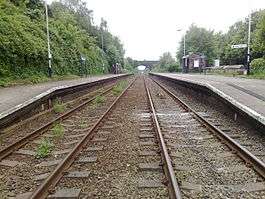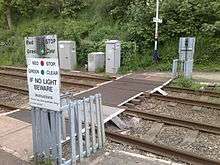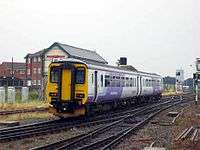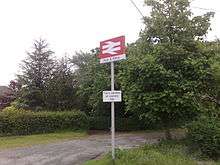Ince and Elton railway station
| Ince and Elton | |
|---|---|
 | |
| Location | |
| Place | Elton, Cheshire |
| Local authority | Cheshire West and Chester |
| Grid reference | SJ456758 |
| Operations | |
| Station code | INE |
| Managed by | Northern Rail |
| Number of platforms | 2 |
| DfT category | F2 |
|
Live arrivals/departures, station information and onward connections from National Rail Enquiries | |
| Annual rail passenger usage* | |
| 2004/05 | 731 |
| 2005/06 |
|
| 2006/07 |
|
| 2007/08 |
|
| 2008/09 |
|
| 2009/10 |
|
| 2010/11 |
|
| 2011/12 |
|
| 2012/13 |
|
| 2013/14 |
|
| 2014/15 |
|
| History | |
| 1 July 1863 | opened as Ince |
| 17 April 1884 | Renamed Ince and Elton |
| National Rail – UK railway stations | |
| * Annual estimated passenger usage based on sales of tickets in stated financial year(s) which end or originate at Ince and Elton from Office of Rail and Road statistics. Methodology may vary year on year. | |
| UK Railways portal | |
Ince and Elton railway station, on the Ellesmere Port to Warrington Line, serves both Ince and Elton in Cheshire, England. The station is unstaffed as it rarely sees a train at any meaningful time of day. 388 passengers are recorded as using the station in 2011–12.
History
Ince station was opened on 1 July 1863 by the Birkenhead Joint Railway.[1] It was renamed Ince and Elton on 17 April 1884.[1] Services were operated jointly by the London and North Western Railway and Great Western Railway up until the 1923 Grouping, then by the GWR and the London, Midland and Scottish Railway. After nationalisation in 1948, the station became part of the London Midland region of British Railways. The route through the station carried significant amounts of freight from the outset, from the docks at Birkenhead and later from the oil refineries and dock complex at Ellesmere Port as well as a local passenger service between Birkenhead Monks Ferry (from opening until March 1878)/Birkenhead Woodside (from April 1878) or Hooton and Helsby, where passenger could access the other section of the joint line between Warrington Bank Quay and Chester.
This station was earmarked for closure, along with Stanlow and Thornton, Helsby and Ellesmere Port, under the proposals made by Dr. Beeching, see (Beeching Axe).[2] This was never implemented, although services gradually began to reduce and the remaining through trains to/from Birkenhead Woodside ended in 1967 when the station there was closed.[3]

Services originally operated regularly between Helsby and Hooton via Ellesmere Port, with some services running through to Rock Ferry prior to the electrification of the line between there and Hooton in 1985. Once electric trains began running to Hooton, the service was revamped to run between Chester and Helsby via Hooton (with a reversal there) every 30 minutes on weekdays & Saturdays. Convenient connections were available at Helsby for Warrington & Manchester and at Hooton for Liverpool. However, following the extension of the third rail southwards to Chester in 1993, the service east of Ellesmere Port was cut back substantially – most trains ran as a shuttle to Ellesmere Port only, with only a two-hourly service beyond there. The pattern was then altered again when electrification of the Hooton to Ellesmere Port section was completed in 1994 – from that point onwards, all services from Helsby terminated at Ellesmere Port but ran beyond Helsby to Warrington Bank Quay and Liverpool Lime Street (every two hours Mon-Sat), calling at all stations en route. The new service was poorly patronised though, and by 1996 it had been cut back to the current pattern of two pairs of services each way in the early morning and mid afternoon.
Some station signs are outdated, displaying information about those former services to Chester and Hooton (see image of sign on Platform 2).
Facilities

There is level access from the small car park at the front of station onto the Helsby platform. From this platform, to reach the Ellesmere Port platform, turn left, go down the platform end ramp, and providing the level crossing warning lights indicate that it is safe, cross the lines using the foot crossing and then up the platform end ramp.
The road leading down from the main road at Ince to the station is step-free, although there is no pavement. The alternative exit, via the narrow path involves walking up steep steps, which is not accessible for passengers with pushchairs and/or mobility problems.
Northern Rail's Adopt-a-Station scheme is in operation at this station. Members of the local community support the station by carrying out regular duties such as picking up litter and ensuring the station remains in a good overall condition.
Services

There is a minimal train service (towards Helsby and to Ellesmere Port). Two of these trains (one morning and one evening) continue to Warrington Bank Quay, whilst the first of the morning comes from there (the one afternoon train that ran through to Liverpool Lime Street no longer operates).[4] These services are operated by Class 156 diesel multiple units, (DMUs), generally in the afternoon, however most early-morning workings are Class 142 'Pacer' trains.
A branch of the Merseyrail electric network Wirral Line terminates at Ellesmere Port, the next but one station to the west after Stanlow and Thornton. Only diesel trains use Ince and Elton station. The likelihood of electrifying the line and incorporating into the Merseyrail network was low, as there are many dangerous substances and cables surrounding the trackside as the line passes through the Stanlow oil refinery. However, Merseytravel have shown interest in taking ownership of the Halton Curve south of Runcorn to incorporate into the Merseyrail network. This might entail the line being electrified and brought onto the Merseyrail network, giving access to Runcorn, Liverpool South Parkway for John Lennon Airport and maybe onto Liverpool Lime Street. This would give access to Liverpool from both directions. Merseytravel's interest is ongoing and no outcome has been released.[5][6]
There is no service on Sundays. A Saturday service operates on most Bank Holidays. In the event of buses replacing trains, only one service in each direction runs, usually in the late afternoon.
In British Rail terminology, this station's rail service(s) would be referred to as a 'Parliamentary train'. This means that the Train Operating Company only runs the minimum number of services required legally, and usually at the least busy times of day, in order to still comply with the law, but to keep operating costs down to an absolute minimum. It is cheaper to run this service than going through a lengthy legal process of applying for station closures.
A rail user group, the North Cheshire Rail User Group, supports and actively campaigns for an improved service at this station and for this railway line.[7]
Public transport interchange

At the station exit, there are two buses each hour. The number 36, operated by GHA Coaches, operates towards Runcorn, or in the opposite direction, towards Ellesmere Port.[8] Buses run until around 19:00 local time.
These services only run Monday-Saturday, (not Bank Holidays). This means that Ince and Elton villages are not served by any public transport on Sundays and public holidays.
There is a free small car park located just outside the station. There is no CCTV or staff at this station.
Freight
Freightliner usually run a class 70 'heavy-haul' service to Ellesmere Port twice a day from/to Fiddlers Ferry on Monday to Fridays. On Saturdays there is one scheduled working.[9]
When the Shell oil refinery at Stanlow used the railways to transport freight, over fifteen trains per day used this line. Since then, the sidings and signal box have been removed, and freight is becoming increasingly rare on this line.
No freight trains currently use the station, other than to pass through it.
Future
Quinn Glass, (part of the Quinn Group) is located in Elton, and is currently undergoing expansion near this railway station. The Network Rail Route Strategy Guide states that Quinn Glass is interested in additional passenger and freight services on this line. It is also interpreted that planning permission requires Quinn Glass to maximise upon existing public transport links, as well as create new ones.[10] These plans could potentially lead to new services on this line, as well as improved station facilities and rolling stock.
References
Notes
- 1 2 Butt (1995). Page 127.
- ↑ Beeching, Dr. Richard. "The Reshaping of British Railways" (PDF). Retrieved 2008-06-21.
- ↑ "Disused Stations - Birkenhead Woodside" Disused Stations; Retrieved 2014-03-21
- ↑ GB eNRT December 2015 Edition, Table 109
- ↑ I met my hon. Friend and my hon : 8 Mar 2005: House of Commons debates (TheyWorkForYou.com)
- ↑ Wales Route Utilisation Strategy - Final Draft
- ↑ "North Cheshire Rail User Group". Retrieved 2008-08-09.
- ↑ "Number 36 Bus Timetable" (PDF). April 2007. Archived from the original (PDF) on 15 September 2008. Retrieved 19 February 2015.
- ↑ "Freightliner Heavy Haul, Railways Act 1993, Section 22: Changes Proposed" (PDF). Office of Rail Regulation. 2005-10-18. Retrieved 2008-08-12.
- ↑ "Quinn Glass Planning Application" (PDF). Archived from the original (PDF) on 27 October 2007. Retrieved 19 February 2015.
Sources
- Butt, R. V. J. (1995). The Directory of Railway Stations: details every public and private passenger station, halt, platform and stopping place, past and present (1st ed.). Sparkford: Patrick Stephens Ltd. ISBN 1-8526-0508-1. OCLC 60251199.
- Awdry, Christopher (1990). Encyclopaedia of British Railway Companies. Sparkford: Patrick Stephens Ltd. ISBN 1-8526-0049-7. OCLC 19514063.
External links
| Wikimedia Commons has media related to Ince and Elton railway station. |
- Train times and station information for Ince and Elton railway station from National Rail
| Preceding station | |
Following station | ||
|---|---|---|---|---|
| Stanlow and Thornton | Northern Rail Ellesmere Port to Warrington Line Mondays-Saturdays only |
Helsby | ||
| ||||||||||||||||||||||||||||||||||||||||||||||||||||||
Coordinates: 53°16′37″N 2°48′58″W / 53.277°N 2.816°W